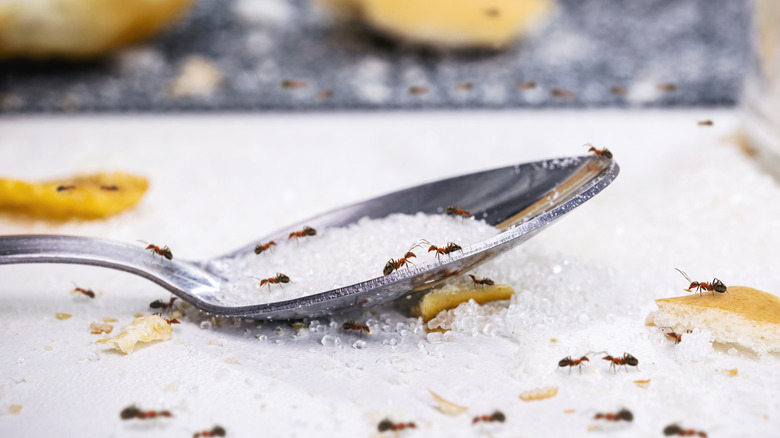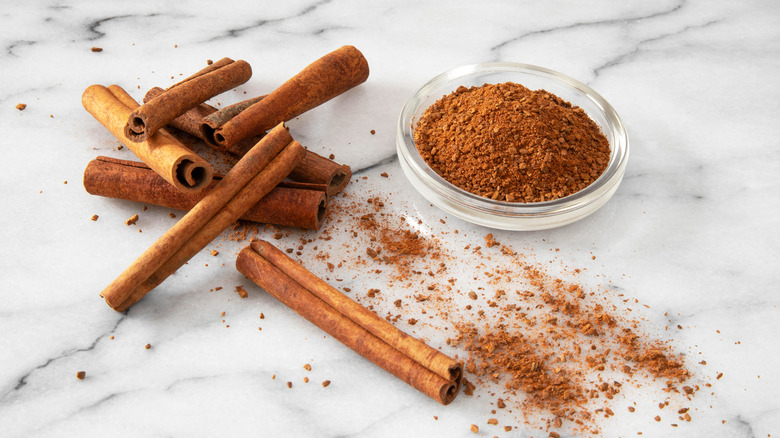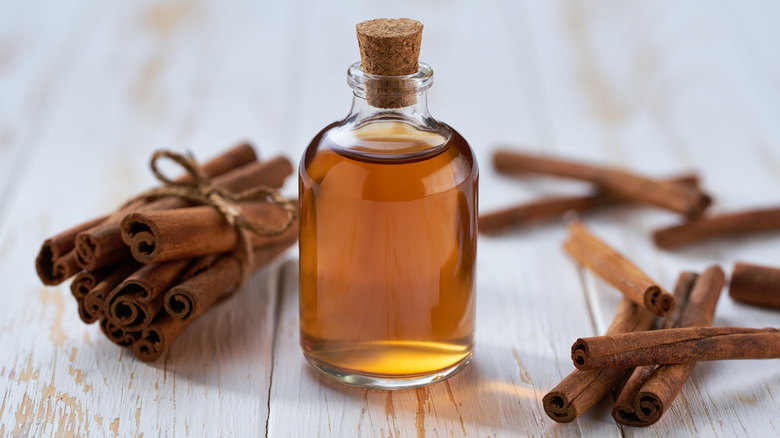One Ingredient Helps Keep Ants At Bay In Your Kitchen. Here's How It Works
We may receive a commission on purchases made from links.
Ants are some of the most relentless kitchen pests out there, and they're some of the hardest to eradicate. That's because they're attracted to food and water (which are abundant in kitchens) and can fit through even the tiniest cracks in door frames and windowsills. Patchouli essential oil is one easy, natural solution for ants in the kitchen that can save you from using harsh chemicals around your food, but there's also an ingredient you probably already have in your pantry that works in a similar way: cinnamon.
Cinnamon is a common pantry spice that has amazing benefits for your garden because it's a natural pest repellent and fungicide. Fortunately, it works in your kitchen, too. In a 2014 study published in the International Journal of Scientific and Research Publications (IJSRP), researchers found that essential oils derived from Cinnamomum cassia (Chinese cinnamon) — the same type used in most brands of the ground stuff — successfully repelled ants.
The main component that ants find so offensive is cinnamaldehyde, which is responsible for the spice's aroma and flavor. Ants use pheromones (chemical signals) to communicate with one another, and cinnamaldehyde produces such a strong scent that it interferes with the pheromone trails they use to navigate between their colonies and food sources.
How to use cinnamon to keep ants out of your kitchen
Using cinnamon to deter ants is just as simple as using crushed, dried bay leaves to prevent kitchen bugs. Simply sprinkle a trail of cinnamon along the ants' path, and don't forget to add a layer around your doorways and windows, too. If you don't want loose powder lying around, mix it with water and use a cotton swab to apply it around your home, or mop your floor with the solution. You can even place cinnamon sticks wherever ants are likely to congregate and crawl. If you have cinnamon essential oil on hand, mix it with water and either use the liquid for mopping or put it in a spray bottle and mist it wherever you see ants, as well as around possible entry points.
Keep in mind, however, that the scent of cinnamon sticks isn't as strong as that of ground cinnamon because the aroma isn't released until the bark's cell walls break down. Also, cinnamon essential oil is even more effective than the ground version because of its higher concentration of cinnamaldehyde. In fact, a 2021 study published in Parasites & Vectors found that the compound accounted for about 90% of Cinnamomum cassia essential oil, while another published in the Journal of Chemical Education in 2008 found that ground Cinnamomum zeylanicum only contains about 0.75% to 3% weight/weight percent of the compound. The average concentration of cinnamaldehyde is generally higher in cassia than in zeylanicum, but this still provides context for the difference between the ground and essential oil variations.
Caveats to using cinnamon as ant repellent
Although researchers reported successfully repelling ants using cinnamon essential oil in the 2014 IJSRP study, it's important to keep in mind that the product they used is much more potent than the ground cinnamon (and even oils) that you can get at the grocer or from online stores, such as Handcraft Blends' cinnamon essential oil from Amazon. It was so potent, in fact, that high concentrations proved fatal for the ants.
Additionally, the effectiveness of using different types of cinnamon — whether it's in ground, essential oil, or stick form — varies between ant species. It's also true that while the spice can deter ants from traveling where you place it, it's possible that they'll just find another way into your kitchen in pursuit of food and water. You may have success if you implement all of these cinnamon applications, but these methods also require regular reapplication and can be toxic to pets.
On top of all that, if a colony has established itself in your home, cinnamon won't get rid of it completely. You may be able to gain some ground and see fewer ants in your kitchen, but you might need professional help to totally eliminate the problem.


